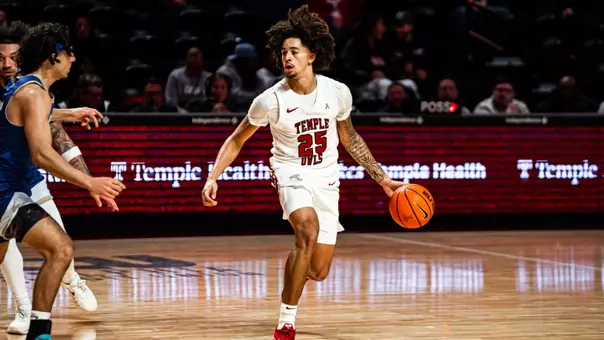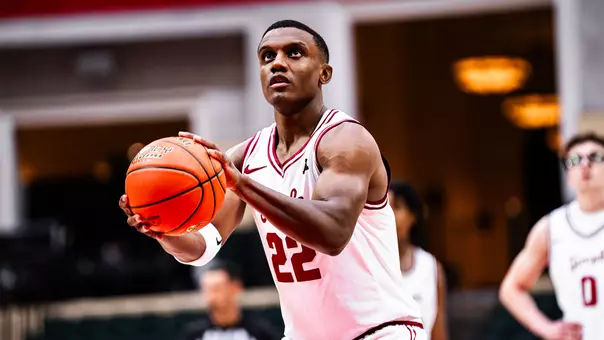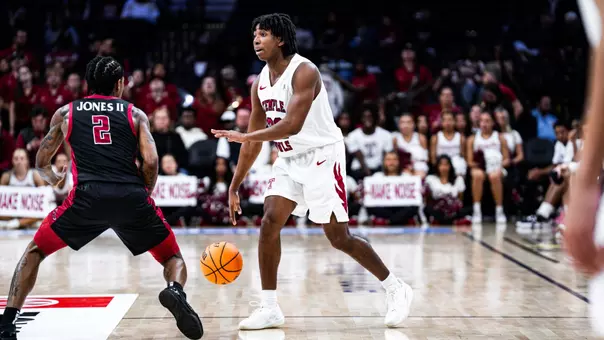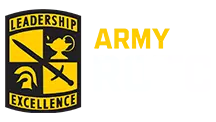Temple University Athletics
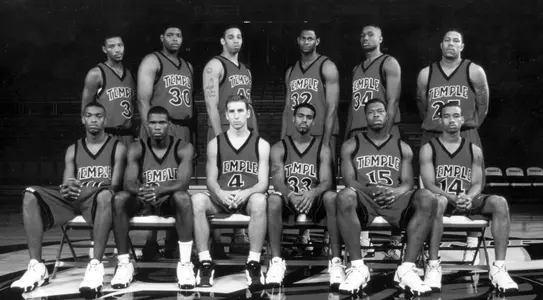
Overlooked No More: 1999 Elite Eight Team Celebrates 20th Anniversary
1.21.19 | Men's Basketball
From 1988-2001, Hall of Famer John Chaney took five Temple teams to the Elite Eight. Each of those NCAA Tournament journeys had their own identity. That's what happens when the last four of those runs were produced by teams that were seeded (in order) 10th, 7th, 6th and 11th, respectively. Still, it didn't stop any of them from writing an improbable story. In reality, the circumstances simply enhanced the memories.
The 1998-99 Owls were the fourth of those teams. They had only one senior, guard Rasheed Brokenborough, who was from University City High School, which is no longer around. They had five players who averaged between 7 and 13 points a game. It would have been six, if sophomore guard Lynn Greer didn't get injured early in the season and end up redshirting. It was a team that opened 4-0 and lost six of its next eight. It was ranked seventh to start the season, fell out of the polls after the fourth week and got back up to No. 24 in the next-to-last vote.
The Owls would lose in the Atlantic 10 final to Rhode Island at the Spectrum, on a long 3-point shot from the left wing by Lamar Odom at the buzzer. They'd beaten the Rams, who'd been to the Elite Eight the year before (when they almost knocked off favored Stanford), twice -- by nine and a dozen.
"That was a real difficult loss," recalled Brokenborough, a lefthander who averaged 11.6 points. "Coach listened to us on that final play, which he never did. We wanted to go man to man, and everybody knew that wasn't us. But that one time he listened. (Odom) just made a great shot. Keaton (Sanders) actually played some great defense on him. The only thing he didn't do was force him to go to his right more. So we felt bad. But Coach didn't bring it up. And I don't think we ever suggested anything to him again.
"We should have stayed in our zone. That's what we did best."
You think?
On Selection Sunday the Owls drew 11th seed Kent State in the NCAA's East Region, in Boston. I still can hear their coach, Gary Waters, answering the obvious question by saying that Temple's defense was "just a zone." Seriously. Of course over the years, he wasn't the only one. Some of us knew better.
"He said that?" Chaney, who just turned 87 years young, laughed out loud when he was recently told as much. "I didn't realize that. I do remember the Texas coach (Rick Barnes, in 2001), saying, 'Why do we have to play them? Why them?'
"I guess we could do that to people."
You think?
The Owls won, 61-54.
"It's funny what you remember," said Brokenborough, who had 15 points to match junior guard Pepe Sanchez for high scorer. "A lot of the stuff kind of blends together, but at one point I almost got in a physical altercation when two guys tried to trap me and I got an elbow in the face. We were taught to focus on what we do. We stayed in the moment."
Next up was Cincinnati, a Top 10 team. And an opponent that Temple seemed to play a lot. So there was no unfamiliarity, something that usually helped Temple a lot. Didn't matter. The Owls led by 11 at halftime. The final was 64-54.
"I think when the bracket came out, most people probably had Cincinnati moving on," Brokenborough noted. "But we knew we had a good team (too). And we were really good in that (postseason) moment. That's how we were built. We didn't really worry about the opponent that much. We knew it was going to be a game, that we were going to be in it, because most teams we were going to face at that point had never seen our zone. It wasn't like when we played teams in our league. The shocking part to me was that the games weren't even close. But you didn't know how it was going to go until you got out there and played.
"The way we played our 1-3-1, it looked like man. It wasn't like we just stood there with our hands up in the air. We exerted a lot of pressure. If you hadn't seen it, it wasn't easy to figure out.
"And I think that team had an edge about it. We had a lot of players who were hungry. We just played hard. We weren't scared of anybody. He recruited that way. If you weren't tough when you got there, you become tough after one or two years. We didn't mind winning ugly. I think we took pride in that."
Next up was Purdue, which had advanced by upsetting Texas and Miami. Despite having 13 losses, the Boilermakers were still ranked late in the season. In 1991, en route to his second Elite Eight, Chaney had beaten Gene Keady's team in the first round by 17 at Maryland's Cole Field House. This time it was more of the same, at the Meadowlands in North Jersey, as Temple moved on 77-55. We'd seen that game before. Many times. Particularly in March.
Still, Chaney hadn't made it out of the first weekend of the Madness in five years. And in 1998 the Owls had lost in the first round by 30 to West Virginia. So even though he'd been this far, in a way it was new territory. Once again. And that's always a refreshingly good thing.
"You know, we went to the NCAAs so many times, they do kind of all tend to blend together," Chaney acknowledged. "Especially when you get to be my age. Thinking hurts right now. It does, man. But we played a style that served us well. We tried to make good decisions and take care of the ball. That gave us a chance. And we believed that. We didn't give a damn what anyone else thought, or how it looked. It worked for us.
"We were usually weak in some areas. So we had to make up for it. We had to be smart enough to play to our strengths. If you played us you were going to have to shoot from the outside. And you were going to have to make shots from there. We had to have the right mindset. And more often than not, we did. Gene was like Bobby (Knight, of Indiana). They wanted the game to flow a certain way. They didn't want people putting up stop signs. And that's exactly what we wanted to do to you."
Freshman center Kevin Lyde was one of the five McDonald's All-Americas Chaney ever signed. And top scorer Mark Karcher, who originally committed elsewhere, was a first-year sophomore that season. Pepe Sanchez would become the A-10 Player of the Year the following season for his ability to run the show, despite averaging less than double digits. But it was guys like Brokenborough that truly made Chaney proud.
"He was a Prop 48 kid, who was raised by his grandmother (in West Philly) in a bad, bad neighborhood," Chaney explained. "But he was the sweetest kid you'd ever meet. The year he had to sit out, I remember the first time he made a B on a test, and he was so excited when he ran into our office to tell us. From then on, he passed all his classes. With upper grades too. He was unbelievable. And he's made something of himself in life, even though some people didn't think he deserved a chance.
"On the court he was like Howie (Evans, from the 1988 Elite Eight team). He didn't say very much. But he'd go through a wall for us. And nobody went through them. And they'd do things to beat you in a sneaky way. But they'd made sure nobody knew about it. I never heard any referee talk about them. If a foul was called on them, they'd just walk away like nothing happened …
"Pepe, he was different. Argentina loco. I'd call him so many dirty names, but he'd always go, 'Me no understand.' But he'd get it done, his way. They all figured it out for themselves."
Eventually, to no one's surprise, it came down to Duke, another team Temple seemed to play a lot. The Blue Devils were loaded with NBA talent, led by freshman Elton Brand. They were No. 1, and they'd won 30 straight. The Owls led early, but Duke went on to the Final Four with an 85-64 victory. The Devils did get upset in the title game by Connecticut. It was the third time that Chaney lost to a top seed in an Elite Eight. The other two had been close games. And two years later they would go down against top-seeded, defending national champion Michigan State. By three.
"I just remember that one play where (sixth man Corey) Maggette (another one-and-done) dunked on us," said Greer, still amazed at the image. "He jumped over like three of our guys, and three of theirs. That kind of stands out the most. We just hadn't seen a team like that. But when you look back, everyone had pretty much counted us out before that. But until you get out on the floor, you really don't know what's going to happen. Whether it's Kent State or whoever. From my point of view, I just remember the intensity of every round just got more and more. As we kept winning it became, 'Oh, man, this is serious.' The arenas were bigger, so was the atmosphere. You could feel the thickness in the air.
"It was different for me, because I could only watch. That's a bittersweet thing. It's such an accomplishment, to get that far. But when you're one step from the Final Four, you want the chance to win it all."
Nonetheless, those Owls will be honored on the 20th anniversary of that feat on Sunday afternoon when the current Temple team hosts, of all folks, Cincinnati, which now is a fellow member of the American Athletic Conference.
In some ways, what that group did two decades ago was a prelude.
The next season, the Owls were, as expected, one of the top teams in the country. Yet as a two seed, they would get eliminated in the second round by Seton Hall. Then, in 2001, a team that included five players from 1999 (led by Greer and Quincy Wadley) had to win the A-10 just to get into the field. Once there, they also were able to defy the odds and win three games.
"For whatever reason I think that ('99) team gets overlooked a little," said Brokenborough. "It doesn't seem like 20 years. In a good way. Time goes fast. I'm older, but I don't feel that old.
"I didn't look at it as my senior year. I thought I might get my (fourth) year (of eligibility) back. Everyone after me did, but I didn't … It's going to be great to see some of the guys again, after so long. You try to stay in touch, but some of them live in other parts of the country and you're all just busy living your lives. We've gotten a lot better about it. Like seven or eight of us are on this app called 'Marco Polo,' and now we communicate almost every day. I think that's important. Especially as we start getting up there …
"The one memory I have is that last game, when they subbed me out near the end. John had been so tough on me, for three years. But he gave me this big hug, and I knew he was trying to hold his emotions, but he told me how much I meant to him. He cried, and I tried not to. I'll never forget that. How could you?
"I didn't get it back then," he went on. "It seemed like everything he said about you was negative. But that's normal. You don't figure it out until years later. I was playing 40 minutes. Then you're like, 'Wow. I can see what he was trying to do.' That's the beauty of it."
No, it didn't have the ultimate happy ending. But it was one heck of a ride. Among many.
"They're all part of (Chaney's) legacy," Greer emphasized. "And we were part of that. It was a humbling experience, having to sit out. But I learned from it. And I was lucky enough to be part of the team two years later. So I got to experience it twice, even if it was in different ways.
"My son (Lynn III, a top player at Roman Catholic) is 16. He watches those games on You Tube. And I'll tell him stories. But he doesn't have to believe me. He can see it for himself. We did some great things."
It will always be about the moments. And their rightful place in the program's history. So cherish the reunions.
Each and all of them.
"You know," said Chaney, chuckling as only he can, "it seems like we're having one of these about every other year."
What a problem to have.

The 1998-99 Owls were the fourth of those teams. They had only one senior, guard Rasheed Brokenborough, who was from University City High School, which is no longer around. They had five players who averaged between 7 and 13 points a game. It would have been six, if sophomore guard Lynn Greer didn't get injured early in the season and end up redshirting. It was a team that opened 4-0 and lost six of its next eight. It was ranked seventh to start the season, fell out of the polls after the fourth week and got back up to No. 24 in the next-to-last vote.
The Owls would lose in the Atlantic 10 final to Rhode Island at the Spectrum, on a long 3-point shot from the left wing by Lamar Odom at the buzzer. They'd beaten the Rams, who'd been to the Elite Eight the year before (when they almost knocked off favored Stanford), twice -- by nine and a dozen.
"That was a real difficult loss," recalled Brokenborough, a lefthander who averaged 11.6 points. "Coach listened to us on that final play, which he never did. We wanted to go man to man, and everybody knew that wasn't us. But that one time he listened. (Odom) just made a great shot. Keaton (Sanders) actually played some great defense on him. The only thing he didn't do was force him to go to his right more. So we felt bad. But Coach didn't bring it up. And I don't think we ever suggested anything to him again.
"We should have stayed in our zone. That's what we did best."
You think?
On Selection Sunday the Owls drew 11th seed Kent State in the NCAA's East Region, in Boston. I still can hear their coach, Gary Waters, answering the obvious question by saying that Temple's defense was "just a zone." Seriously. Of course over the years, he wasn't the only one. Some of us knew better.
"He said that?" Chaney, who just turned 87 years young, laughed out loud when he was recently told as much. "I didn't realize that. I do remember the Texas coach (Rick Barnes, in 2001), saying, 'Why do we have to play them? Why them?'
"I guess we could do that to people."
You think?
The Owls won, 61-54.
"It's funny what you remember," said Brokenborough, who had 15 points to match junior guard Pepe Sanchez for high scorer. "A lot of the stuff kind of blends together, but at one point I almost got in a physical altercation when two guys tried to trap me and I got an elbow in the face. We were taught to focus on what we do. We stayed in the moment."
Next up was Cincinnati, a Top 10 team. And an opponent that Temple seemed to play a lot. So there was no unfamiliarity, something that usually helped Temple a lot. Didn't matter. The Owls led by 11 at halftime. The final was 64-54.
"I think when the bracket came out, most people probably had Cincinnati moving on," Brokenborough noted. "But we knew we had a good team (too). And we were really good in that (postseason) moment. That's how we were built. We didn't really worry about the opponent that much. We knew it was going to be a game, that we were going to be in it, because most teams we were going to face at that point had never seen our zone. It wasn't like when we played teams in our league. The shocking part to me was that the games weren't even close. But you didn't know how it was going to go until you got out there and played.
"The way we played our 1-3-1, it looked like man. It wasn't like we just stood there with our hands up in the air. We exerted a lot of pressure. If you hadn't seen it, it wasn't easy to figure out.
"And I think that team had an edge about it. We had a lot of players who were hungry. We just played hard. We weren't scared of anybody. He recruited that way. If you weren't tough when you got there, you become tough after one or two years. We didn't mind winning ugly. I think we took pride in that."
Next up was Purdue, which had advanced by upsetting Texas and Miami. Despite having 13 losses, the Boilermakers were still ranked late in the season. In 1991, en route to his second Elite Eight, Chaney had beaten Gene Keady's team in the first round by 17 at Maryland's Cole Field House. This time it was more of the same, at the Meadowlands in North Jersey, as Temple moved on 77-55. We'd seen that game before. Many times. Particularly in March.
Still, Chaney hadn't made it out of the first weekend of the Madness in five years. And in 1998 the Owls had lost in the first round by 30 to West Virginia. So even though he'd been this far, in a way it was new territory. Once again. And that's always a refreshingly good thing.
"You know, we went to the NCAAs so many times, they do kind of all tend to blend together," Chaney acknowledged. "Especially when you get to be my age. Thinking hurts right now. It does, man. But we played a style that served us well. We tried to make good decisions and take care of the ball. That gave us a chance. And we believed that. We didn't give a damn what anyone else thought, or how it looked. It worked for us.
"We were usually weak in some areas. So we had to make up for it. We had to be smart enough to play to our strengths. If you played us you were going to have to shoot from the outside. And you were going to have to make shots from there. We had to have the right mindset. And more often than not, we did. Gene was like Bobby (Knight, of Indiana). They wanted the game to flow a certain way. They didn't want people putting up stop signs. And that's exactly what we wanted to do to you."
Freshman center Kevin Lyde was one of the five McDonald's All-Americas Chaney ever signed. And top scorer Mark Karcher, who originally committed elsewhere, was a first-year sophomore that season. Pepe Sanchez would become the A-10 Player of the Year the following season for his ability to run the show, despite averaging less than double digits. But it was guys like Brokenborough that truly made Chaney proud.
"He was a Prop 48 kid, who was raised by his grandmother (in West Philly) in a bad, bad neighborhood," Chaney explained. "But he was the sweetest kid you'd ever meet. The year he had to sit out, I remember the first time he made a B on a test, and he was so excited when he ran into our office to tell us. From then on, he passed all his classes. With upper grades too. He was unbelievable. And he's made something of himself in life, even though some people didn't think he deserved a chance.
"On the court he was like Howie (Evans, from the 1988 Elite Eight team). He didn't say very much. But he'd go through a wall for us. And nobody went through them. And they'd do things to beat you in a sneaky way. But they'd made sure nobody knew about it. I never heard any referee talk about them. If a foul was called on them, they'd just walk away like nothing happened …
"Pepe, he was different. Argentina loco. I'd call him so many dirty names, but he'd always go, 'Me no understand.' But he'd get it done, his way. They all figured it out for themselves."
Eventually, to no one's surprise, it came down to Duke, another team Temple seemed to play a lot. The Blue Devils were loaded with NBA talent, led by freshman Elton Brand. They were No. 1, and they'd won 30 straight. The Owls led early, but Duke went on to the Final Four with an 85-64 victory. The Devils did get upset in the title game by Connecticut. It was the third time that Chaney lost to a top seed in an Elite Eight. The other two had been close games. And two years later they would go down against top-seeded, defending national champion Michigan State. By three.
"I just remember that one play where (sixth man Corey) Maggette (another one-and-done) dunked on us," said Greer, still amazed at the image. "He jumped over like three of our guys, and three of theirs. That kind of stands out the most. We just hadn't seen a team like that. But when you look back, everyone had pretty much counted us out before that. But until you get out on the floor, you really don't know what's going to happen. Whether it's Kent State or whoever. From my point of view, I just remember the intensity of every round just got more and more. As we kept winning it became, 'Oh, man, this is serious.' The arenas were bigger, so was the atmosphere. You could feel the thickness in the air.
"It was different for me, because I could only watch. That's a bittersweet thing. It's such an accomplishment, to get that far. But when you're one step from the Final Four, you want the chance to win it all."
Nonetheless, those Owls will be honored on the 20th anniversary of that feat on Sunday afternoon when the current Temple team hosts, of all folks, Cincinnati, which now is a fellow member of the American Athletic Conference.
In some ways, what that group did two decades ago was a prelude.
The next season, the Owls were, as expected, one of the top teams in the country. Yet as a two seed, they would get eliminated in the second round by Seton Hall. Then, in 2001, a team that included five players from 1999 (led by Greer and Quincy Wadley) had to win the A-10 just to get into the field. Once there, they also were able to defy the odds and win three games.
"For whatever reason I think that ('99) team gets overlooked a little," said Brokenborough. "It doesn't seem like 20 years. In a good way. Time goes fast. I'm older, but I don't feel that old.
"I didn't look at it as my senior year. I thought I might get my (fourth) year (of eligibility) back. Everyone after me did, but I didn't … It's going to be great to see some of the guys again, after so long. You try to stay in touch, but some of them live in other parts of the country and you're all just busy living your lives. We've gotten a lot better about it. Like seven or eight of us are on this app called 'Marco Polo,' and now we communicate almost every day. I think that's important. Especially as we start getting up there …
"The one memory I have is that last game, when they subbed me out near the end. John had been so tough on me, for three years. But he gave me this big hug, and I knew he was trying to hold his emotions, but he told me how much I meant to him. He cried, and I tried not to. I'll never forget that. How could you?
"I didn't get it back then," he went on. "It seemed like everything he said about you was negative. But that's normal. You don't figure it out until years later. I was playing 40 minutes. Then you're like, 'Wow. I can see what he was trying to do.' That's the beauty of it."
No, it didn't have the ultimate happy ending. But it was one heck of a ride. Among many.
"They're all part of (Chaney's) legacy," Greer emphasized. "And we were part of that. It was a humbling experience, having to sit out. But I learned from it. And I was lucky enough to be part of the team two years later. So I got to experience it twice, even if it was in different ways.
"My son (Lynn III, a top player at Roman Catholic) is 16. He watches those games on You Tube. And I'll tell him stories. But he doesn't have to believe me. He can see it for himself. We did some great things."
It will always be about the moments. And their rightful place in the program's history. So cherish the reunions.
Each and all of them.
"You know," said Chaney, chuckling as only he can, "it seems like we're having one of these about every other year."
What a problem to have.

Ep. 28: Vice President/Debbie & Stanley Lefkowitz '65 Director of Athletics Arthur Johnson
Friday, December 12
Ep. 27: Men's Crew Student-Athlete Adam Curran
Thursday, December 11
MBB Press Conference vs. Georgian Court (Adam Fisher)
Tuesday, December 09
MBB Press Conference vs. Georgian Court (Connor Gal & Jordan Mason)
Tuesday, December 09


